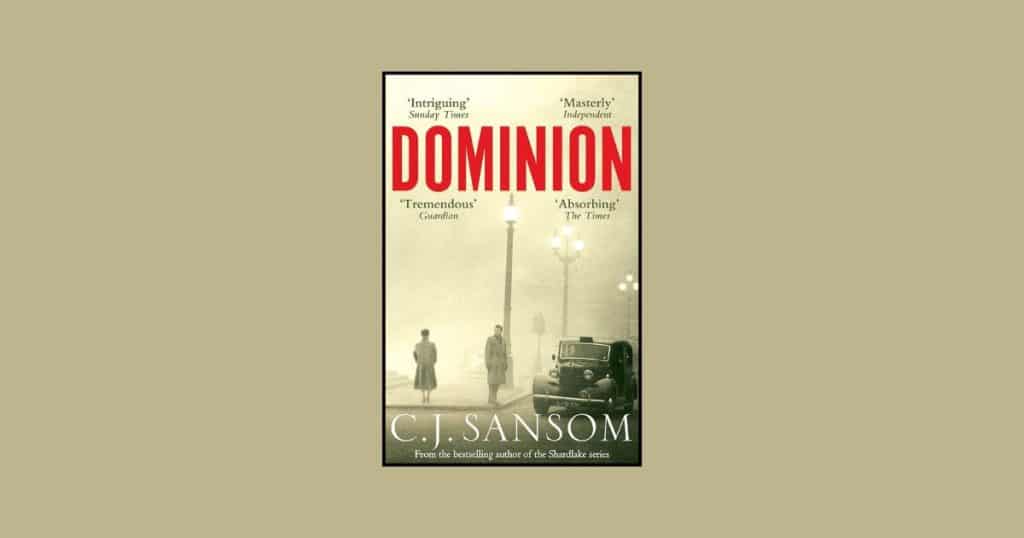
Saddened by the news of C.J. Sansom’s death only a couple of weeks ago (what a loss to literature and culture), I made up my mind to read a book of his I hadn’t yet tackled – his standalone, alternate history, Dominion. Being a huge fan of the Shardlake series, and eagerly awaiting his next instalment (I wonder if we will ever get to read Ratcliff?), I hoped that since Christopher Sansom was both an historian with a PhD and lawyer, his ‘what if?” novel about global politics post-World War II and an alternate modern history, rather than the Tudors, should be both provocative and satisfying.

In Dominion, we’re presented with a Britain that rather than continuing the war with Germany, came to terms with Germany in 1940 (a real turning point in the war as Sansom notes in his comprehensive Author’s Notes which are so worth reading). Fast forward twelve years to 1952 and the Prime Minister and his cabinet think nothing of trading with Germany and its subject countries, sending an endless conga line of soldiers to help the Germans in their ongoing and futile war with Russia, and are generally obedient to Germany’s demands and way of operating. Censorship abounds, people regard one another with suspicion, and racism and jingoism are normalised. Auxiliary police (vigilantes by any other name) “help” keep the peace with predictable brutality and bigotry. British Jews, while they’re not being rounded up and sent to “internment camps” as they are in Europe (wilful ignorance about what’s really happening to the Jews is rife), are nonetheless forced to wear identification and are openly discriminated against – as is anyone of colour or difference. Anyone, that is, that doesn’t represent “Britain for the Brits” – in other words, folk that are white. Churchill is no longer in the government but head of the Resistance – a movement which the reader is introduced to in the form of a benign civil servant, David Fitzgerald, who for personal reasons as well as political ideology and social justice, is drawn into dangerous efforts to undermine the Third Reich and its stranglehold on Britain.

When David and the cell of which he’s a part are tasked with rescuing a young scientist friend of David’s from his university days, Frank, from an asylum, their lives – and those of the people they love – are at imminent and deadly risk. Especially because the Gestapo, and one Gunther Hoth from Germany, in league with British police, are close on their heels. For Frank holds a secret that could change the course of the world.
To be blunt, I had an ambivalent reaction to this book, perhaps because of my own cultural background or because in the end, while I respect and appreciated this version of what might have unfolded had Britain capitulated to Germany, I found it very bleak and quite repetitive. There was a great deal of explication and not enough time for the characters to really grow. Action that unfolded in one chapter often occurs again in the following but from a different character’s viewpoint. While it provides another perspective and certainly context for understanding (as does history, so I think I understand what Sansom was trying to do there), there were times I wanted the narrative to move forward faster rather than get bogged down in detail the reader already knows or personal histories that aren’t, in the scheme of things, relevant (though they do form part of the larger “what-if?” jigsaw). Having said that, the whole notion of atrocious figures like Hitler, Himmler, and Goebbels meeting with various British leaders, negotiating trade agreements and bargaining over various policies, and one of them even being in London to lay a wreath on Remembrance Day at a war memorial, all while a swastika blazes from their uniform and the floral tribute they carry – all of which was “normal” in this version of ht past – was simultaneously appalling and frightening.
Overall, I’m really glad I read this and it’s certainly deepened my appreciation and respect for C.J. Sansom and his writings. But I think for my next venture, I might wait a while to read Winter in Madrid (his other standalone about the Spanish Civil War) and reread some Shardlake instead.
